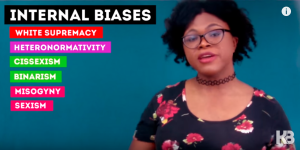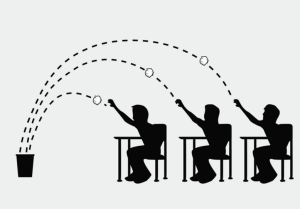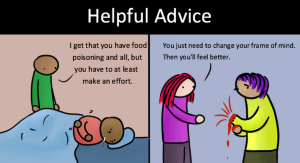There is a lot of media representation of people entering new relationships.
Popular movies, series, literature, and music all represent the processes that come with starting to date a new partner – navigating the shyness, the confusion, the excitement, the infatuation, and all the other feelings that come with entering new (heteronormative) relationships.
And by heteronormative relationships, I mean relationships which are heterosexual, monogamous, and otherwise conform to society’s idea of what a “normal” relationship is like.
These relationships are well-represented in the media, but when it comes to non-monogamous relationships, we’re kinda out of our depth.
I came to terms with my polyamory when I was dating someone I loved deeply. I met another wonderful person, realized I liked them too, and I found myself being deeply attracted to two people at once.
As excited as I was to realize I was polyamorous and potentially explore this new connection, I didn’t know whether dating my new love interest was a good idea or not.
This is because I had never seen relationships like mine represented in the media. On top of being polyamorous, I am also queer – and relationships between queer people are also really underrepresented in the media.
You see, I had no blueprint for entering a relationship when you already had a partner.
I didn’t know what to expect, where to find support, or whose advice to take. I didn’t know how to go about entering the relationship. I didn’t know what conversations to have with my new partner, what sort of problems would arise, and how to tackle them.
The truth is, I felt anxious about whether I’d have the time and energy for someone else. I feared that a break-up with one person would lead to a break-up with the other. I worried about whether my partners would get along, or whether one of them would feel neglected.
Also, and most painfully, I felt unworthy of being loved by one person, let alone two.
It was a confusing time. But now that I’ve been through the process of committing to another partner – quite a few times – I have some thoughts to share.
If you’re in a non-monogamous situation, already have a partner (or two or more!), and are considering entering a relationship with a new person, this might be helpful for you!
Here are some useful questions to ask yourself before committing to another partner.
1. Do I Have the Time, Energy, Resources, and Emotional Capacity for Another Relationship?
Often, being polyamorous is described as having unlimited love to give to others. For many polyamorous people, love feels like a non-finite resource.
But love is not all that we give in relationships. We also give our time, energy, resources, and emotional space to the people we commit to.
If you overcommit, you can end up feeling as if you’re stretched too thin – which can lead to a lot of frustration and hurt for you and your partner(s).
So, before committing to another partner, ask yourself if you can give them the time, energy, and support that they deserve.
This doesn’t only include considering the time you dedicate to your current partner(s), but to other aspects of your life.
Do you have any strenuous work commitments or family responsibilities? Are you busy with school, college, or other studies? Are you planning on moving? Are you taking care of a family member?
Are you in an emotional and mental space where you can take on another partner?
Remember to prioritize self-care. You might have enough energy and time for another person, but remember that you need to have energy and time for yourself, too!
If you’re someone who enjoys spending time alone, you might find it overwhelming to be committed to many different partners – particularly if your partners expect to spend a lot of time with you.
Think not only about your situation now, but what your situation will be a few months along the line.
2. How Are Your Current Relationships Doing?
In my experience, taking on a new relationship can enhance your current relationships. But they can also highlight pre-existing problems.
We know that working on relationships can take up a great deal of time and energy. This can be even more so when you have multiple partners, especially since difficulties and insecurities in one relationship could spill over into another.
For example, if one partner is dishonest with you, you might feel like you’re unable to trust them. This mistrust could be misdirected towards your other partner, particularly if you’re struggling to work on honesty and mistrust in either relationship.
Of course, no relationship is perfect. I’m not saying your current relationship needs to be all sunshine and daisies in order to take on another relationship.
What I am saying is that your relationship needs to be healthy and manageable.
Do you think your current relationships are healthy or toxic? Are you making an effort to work on your current relationship(s)? Is the effort reciprocated by your partner(s)?
If your relationship is very difficult, consider whether you might be taking on a new relationship to mask issues with your current partner.
Are you taking on a new relationship because your current partner neglects you? Are you feeling insecure in the relationship? Does your current relationship make you feel unfulfilled?
Polyamory is beautiful because it makes us realize that no single partner can fulfill all our needs. But one relationship – however fulfilling – can’t make up for a relationship that makes you unhappy.
For obvious reasons, it’s not a good idea to take on one relationship when the other one isn’t in good shape. Bringing more people into a toxic situation can cause a great amount of distress for everyone involved.
3. How Would They Fit into My Family (And Vice Versa)?
By family, I don’t only mean the people you’re related to.
I’m talking about your support network, your close friends, your household and, of course, your current partner(s).
One of the first things I think about when I meet someone I’m very attracted to is whether my current partner likes them. Since my partner is a very perceptive, thoughtful person, I trust their judgement.
I think of my partner as my best friend, so I wanted them to like my new partners as much as I did – the same way as I’d want my best friends to like my partners.
Chances are that your new partner will spend a lot of time with your family. If they don’t get along, it can lead to a lot of stress for everyone involved.
And if you don’t think that your new partner would get along with your family, ask yourself why that is.
It could be indicative of deeper underlying issues with your family, current partner, or potential new partner. It also might just be a situation where two perfectly lovely people don’t get along for no particular reason.
I’ve met a number of people who decided against dating someone because their partners felt too insecure. In those cases, they took time to work on their partners’ insecurities before taking on a new relationship.
Similarly, I’ve met people whose partners don’t get along simply because of a clash of personalities.
Similarly, it’s important to ask yourself whether you will fit into your potential partner’s family.
Consider the people in their life. Are they in committed relationships? Do they have more casual sexual and/or romantic relationships with others? Do they have children? What are their friends like? Will you get along?
If not, how will it affect your relationship?
4. Can This Relationship Be Mutually Beneficial?
This is a question that applies to all relationships.
In order for relationships to be healthy, happy, and fulfilling, they should be mutually beneficial.
Ask yourself: What can you bring to the table, and what can your potential partner bring to the table?
Stability? Security? Comfort? Intellectual stimulation? Fun?
There are many ways that people can add value to a relationship. Ask yourself whether all involved parties are able to give and receive value.
5. What Issues Could Arise (And How Could We Tackle Them)?
Once again, this is a good question to ask yourself when entering a new relationship, whether you’re polyamorous or not.
Jealousy? Communication issues?
Are these issues fixable? If so, how could they be addressed?
I’m a person who struggles with communication when I’m feeling anxious, rejected, frustrated, or – let’s be honest – hungry.
I know this will be an issue when I enter relationships, so I try to be upfront about it. I try to let my partners know when they need to let me cool down (or feed me). It’s still a struggle, but being honest about it makes it easier to manage.
I’m addressing my communication issues, but at the moment, I’m also struggling to effectively deal with some mental health issues. As a result, I need a lot of understanding, guidance, and support from my partners and close friends.
At the moment, there’s no way that I can take on a partner who isn’t very clued-up and sensitive towards my mental health issues.
It just wouldn’t work.
You can’t preempt every single issue that will come up, and you certainly can’t fix them in advance. But it’s useful to be mindful of potential issues, and to have a plan in case they arise.
6. What Are My Expectations?
What sort of structure will your relationship have? Will your relationship be romantic and/or sexual?
Is there an expectation that your new partner will be sexually or romantically involved with your other partners? Will you be sexually or romantically involved with their partners?
Do you want a relationship that’s very serious, with a view to stay together for a long time? Do you want something temporary where you don’t make plans for the future?
What things do you expect to do in your relationship? Will you spend time with their family and vice versa? Is it a long-distance relationship? If so, how often will you communicate with one another, and how?
Having an idea about what you want your relationship to be like allows you to figure out whether it’s something you really want.
Maybe your expectations aren’t very specific.
Maybe you’re not 100% sure about what you do want, but you know for sure what you don’t want.
That’s okay. Take your time to figure it out! It’s not important that you know exactly what you want from the beginning of the relationship. But it’s important that you communicate about your expectations to your partner(s).
7. What Are Their Expectations?
Once you figure out what you want, need, and expect, it’s easier to begin thinking about what your potential partner wants.
From there, you can figure out whether you can fulfill those desires, and whether they can fulfill your desires.
This is useful for when it comes to setting boundaries in your relationship.
8. Why Do I Want to Be with This Person?
In my experience, plenty of polyamorous people – particularly those who are new to polyamory! – make the mistake of entering new relationships for the sake of entering new relationships.
This is to say that they enter relationships not because they’re incredibly attracted to the idea of being with that person, but just because they can.
And I get it! Relationships can be so fulfilling, and loving people can be such a beautiful and rewarding experience. The idea of loving dozens of people at once is appealing to many people, myself included.
But we need to be realistic about our attraction to others.
If we’re attracted to the idea of a person instead of the actual person, we run the risk of causing them – and ourselves – plenty of pain.
Romanticizing the idea of someone instead of appreciating them for who they are is also incredibly objectifying.
Consider why you want to date that person specifically. What are they adding to your life? What makes them special?
Remembering why they’re important to you is essential in motivating yourself to work at the relationship.
***
To commit or not to commit: It’s never an easy decision to make.
The decision is even harder when you already have a partner and you’re trying to figure out the parameters of a potential new, non-monogamous relationship.
Hopefully through careful consideration and deep introspection, you’ll be better equipped to make an informed decision and navigate successfully through the exciting and complex world of polyamory and dating.
[do_widget id=’text-101′]
Sian Ferguson is a Contributing Writer at Everyday Feminism and a queer, polyamorous, South African feminist who is currently studying towards a Bachelor of Arts majoring in English and Anthropology. Originally from Cape Town, she now studies at Rhodes University in Grahamstown, where she works as vice-chair of the Gender Action Project. She has been featured as a guest writer on websites such as Women24 and Foxy Box, while also writing for her personal blog. Follow her on Twitter @sianfergs. Read her articles here.
Search our 3000+ articles!
Read our articles about:
Our online racial justice training
Used by hundreds of universities, non-profits, and businesses.
Click to learn more





















